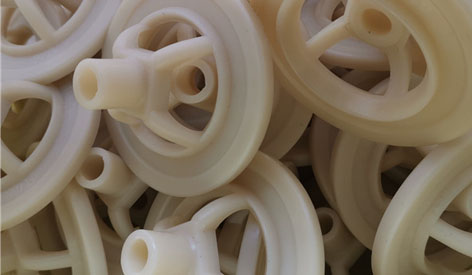ㆍPrivacy: We respect your privacy. Here you can find an example of a non-disclosure agreement. By submitting this form, you agree to our terms & conditions and privacy policy.
Views: 29 Author: Site Editor Publish Time: 2024-05-14 Origin: Site









Glass-filled nylon, also known as glass-reinforced nylon, is a versatile material widely used in injection molding for its excellent mechanical properties and cost-effectiveness. In this technical article, we'll delve into the requirements, techniques, and advantages of glass-filled nylon injection molding.
1. Material Composition and Properties: Glass-filled nylon combines nylon polymers with glass fibers to enhance strength, stiffness, and dimensional stability. The percentage of glass fibers can vary, affecting properties like tensile strength, impact resistance, and heat deflection temperature.
2. Mold Design Considerations: Designing molds for glass-filled nylon requires attention to detail. Factors such as gate placement, cooling channels, and venting play crucial roles in achieving high-quality parts with minimal defects.
3. Injection Molding Process: The injection molding process for glass-filled nylon involves melting the material, injecting it into a mold cavity under high pressure, and cooling to solidify the part. Proper temperature control and injection speed are essential for optimal results.
4. Mold Temperature and Cooling: Maintaining the right mold temperature is critical to prevent warping, shrinkage, and internal stresses in the molded parts. Efficient cooling systems ensure uniform cooling and consistent part quality.
5. Part Design for Strength and Durability: Designing parts with glass-filled nylon requires considerations for part geometry, wall thickness, ribbing, and filleting to maximize strength while minimizing material usage.
6. Surface Finish and Appearance: Glass-filled nylon parts can achieve smooth surface finishes, but mold surface treatments and part ejection methods impact the final appearance. Proper polishing and finishing techniques enhance aesthetics.
7. Quality Control and Testing: Stringent quality control measures, including dimensional inspection, mechanical testing, and visual inspection, ensure that glass-filled nylon parts meet the required specifications and standards.
8. Advantages of Glass-Filled Nylon: Glass-filled nylon offers several advantages, including high strength-to-weight ratio, chemical resistance, dimensional stability, and suitability for complex shapes and tight tolerances.
9. Applications of Glass-Filled Nylon Parts: Glass-filled nylon parts find applications in automotive components, consumer goods, electrical enclosures, industrial equipment, and more, where strength, durability, and cost-effectiveness are paramount.
10. Jucheng Precision: Your Partner in Glass-Filled Nylon Injection Molding Jucheng Precision excels in glass-filled nylon injection molding, leveraging advanced equipment, experienced engineers, and stringent quality control processes to deliver high-quality, precise, and durable parts. With a commitment to customer satisfaction and a focus on innovation, Jucheng Precision is your trusted partner for all your injection molding needs.
Looking for reliable and high-quality glass-filled nylon injection molding services? Look no further than Jucheng Precision. With state-of-the-art equipment, expert engineers, and a dedication to excellence, we deliver superior glass-filled nylon parts that meet your specifications and exceed your expectations. Contact Jucheng Precision today to start your glass-filled nylon injection molding project with confidence.
content is empty!

